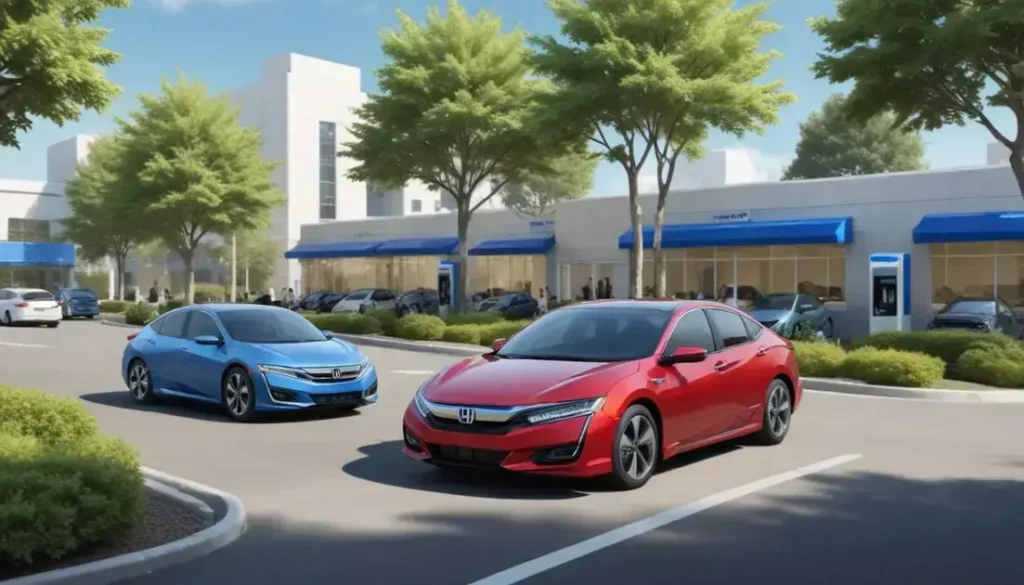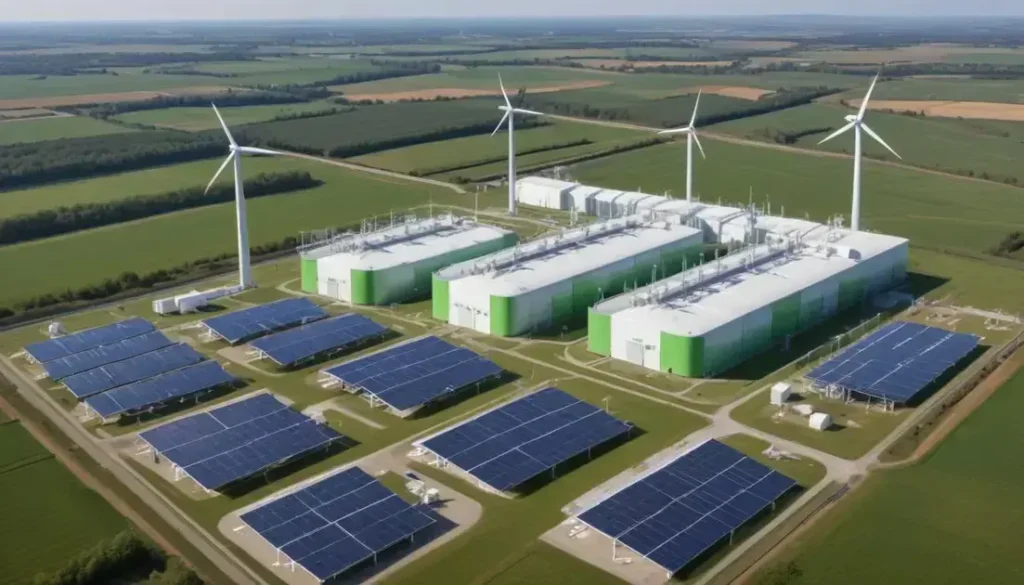Honda’s commitment to sustainability, through its ESG initiatives, emphasizes carbon neutrality, electric vehicle growth, and responsible supply chain practices, providing a model for Indian businesses to enhance operations and meet environmental goals.
Honda’s environmental commitment focuses on achieving Honda‘s goal of carbon neutrality by 2050, reshaping the auto industry for Indian businesses.
Introduction to Honda’s ESG Strategy
Honda has established a comprehensive Environmental, Social, and Governance (ESG) strategy aimed at enhancing sustainability and operational efficiency. Central to this strategy is the commitment to achieve carbon neutrality by 2050, which will reshape the automotive landscape globally and in India.
A key component of Honda’s ESG initiatives includes investing in electric vehicles (EV). The company is focusing on expanding its EV lineup to cater to the increasing consumer demand for environmentally friendly transportation solutions. This shift not only aligns with global sustainability goals but also positions Honda competitively in the Indian market.
Moreover, Honda’s initiative to utilize renewable energy sources in manufacturing plants exemplifies its commitment to reducing carbon emissions. By transitioning to solar and wind energy, Honda aims to minimize its environmental footprint and lead by example in the automotive sector.
Engagement with stakeholders, including suppliers and customers, forms another cornerstone of Honda’s strategy. Through collaboration, Honda is not only enhancing its supply chain sustainability but also fostering a culture of responsibility and accountability within the industry. Such initiatives are pivotal in creating a lasting impact on both local communities and the broader environment.
Goals for Net Zero Carbon Emissions
Honda’s ambition for net zero carbon emissions by 2050 is a pillar of its ESG strategy. Achieving this goal involves comprehensive measures across various levels of operation. The company aims to reduce emissions from its manufacturing processes, transitioning to cleaner energy sources such as solar and wind energy.
Honda is also focusing on enhancing the efficiency of its vehicles. By implementing innovative technologies, such as hybrid systems and full electric drivetrains, Honda plans to minimize the environmental impact of its product lineup significantly.
In addition, engaging with suppliers to encourage sustainable practices forms a crucial part of Honda’s strategy. This collaboration is essential for ensuring that the entire supply chain contributes to reducing carbon footprints. By establishing clear expectations and guidelines, Honda fosters a culture of sustainability that extends beyond its direct operations.
Furthermore, Honda is investing in research and development of alternative fuels and sustainable materials, which plays a vital role in achieving emission reduction targets. These initiatives not only address current environmental challenges but also prepare Honda for future regulatory requirements and market expectations, ensuring long-term success and adherence to sustainability goals.
Electric Vehicle Initiatives by Honda
Honda is making significant strides with its electric vehicle (EV) initiatives as part of its broader commitment to sustainability. The company has set ambitious targets to expand its EV lineup, aiming to offer a diverse range of models catering to different consumer needs by 2030. This initiative is crucial for enhancing Honda’s competitive edge in the growing Indian market.
The introduction of advanced technologies plays a key role in these initiatives. Honda focuses on developing high-efficiency batteries and robust electric drivetrains, ensuring that its vehicles provide optimal performance with lower environmental impact. Moreover, Honda’s research into charging infrastructure is essential for creating an ecosystem that supports widespread EV adoption.
In India, Honda is collaborating with local stakeholders to enhance public awareness and accessibility of EVs. The company is investing in educational campaigns that highlight the benefits of electric mobility, not only for the environment but also for long-term cost savings for consumers.
Additionally, Honda’s commitment to recycling and sustainability extends to its manufacturing processes, where it prioritizes the use of eco-friendly materials. By promoting a circular economy within its supply chain, Honda aims to reduce waste while producing high-quality electric vehicles that appeal to environmentally-conscious consumers.
Carbon-Neutral Factories and Renewable Energy
Honda’s commitment to establishing carbon-neutral factories reflects a pivotal component of its overall sustainability strategy. The company is actively pursuing innovative manufacturing processes that significantly reduce greenhouse gas emissions. This approach involves integrating renewable energy sources, such as solar and wind power, into its production facilities.
By investing in energy-efficient technologies and sustainable materials, Honda aims to minimize its environmental footprint. These advancements not only contribute to carbon neutrality but also enhance operational efficiency, lowering costs in the long run. Implementing smart factory solutions further optimizes resource use, ensuring that every aspect of production adheres to eco-friendly practices.
Moreover, Honda is committed to transparency in its operations. The company regularly reports on its emissions reductions and energy usage, showcasing its progress toward sustainability goals. Engaging with local communities and stakeholders is also essential, as it allows Honda to align its initiatives with regional environmental objectives and fostering a shared vision for a sustainable future.
As part of its strategy, Honda is exploring partnerships with renewable energy providers, which will help in sourcing clean energy for its operations. These collaborative efforts ensure that Honda not only meets but exceeds regulatory requirements, positioning itself as a leader in sustainable manufacturing within the automotive industry.
Supply Chain Engagement Strategies
Honda’s supply chain engagement strategies are essential for achieving its sustainability goals. By collaborating with suppliers, Honda ensures that sustainability practices are integrated throughout its operations. This partnership emphasizes the importance of eco-friendly materials and processes, allowing Honda to minimize its overall environmental impact.
One of the key strategies involves conducting regular assessments of suppliers to ensure they meet strict sustainability criteria. Honda provides support and resources to help suppliers enhance their practices, from reducing waste to improving energy efficiency. This proactive engagement fosters a culture of sustainability within the supply chain.
Moreover, Honda encourages suppliers to adopt innovative technologies and practices that align with its corporate responsibility objectives. This includes investing in training programs that educate suppliers about emissions reduction and sustainability best practices. As a result, Honda not only strengthens its supply chain but also contributes to broader environmental initiatives.
Additionally, Honda’s commitment to transparency is reflected in its reporting mechanisms. This allows the company to track progress and identify areas for improvement. By sharing results and challenges with stakeholders, Honda builds trust and accountability across its supply chain, leading to long-lasting partnerships focused on shared environmental goals.
Governance and Risk Management in ESG
Governance and Risk Management are critical components of Honda’s Environmental, Social, and Governance (ESG) strategy. A robust governance framework ensures that sustainable practices are not only promoted but also integrated into the company’s operations. Honda emphasizes transparency and accountability in its decision-making processes to build trust among stakeholders.
To effectively manage risks associated with sustainability, Honda has implemented comprehensive assessments to identify potential environmental and social impacts. This proactive approach enables the company to mitigate risks before they escalate, ensuring compliance with regulatory standards and industry norms.
In addition, Honda’s governance structure includes a dedicated ESG committee responsible for overseeing all sustainability initiatives. This committee collaborates with various departments to align corporate strategies with environmental goals. Regular audits and evaluations are conducted to monitor progress and implement corrective measures when necessary.
Furthermore, engaging with stakeholders plays a vital role in Honda’s risk management strategy. By gathering input from suppliers, customers, and employees, Honda can address concerns and adapt its practices to meet evolving expectations. This inclusivity not only enhances the company’s reputation but also reinforces its commitment to sustainability across all levels of the organization.
Conclusion and Implications for Indian Businesses
Honda’s commitment to sustainability will have significant implications for Indian businesses. As Honda rolls out its ESG initiatives, local companies can gain insights into effective sustainability practices that align with global standards. This drive towards sustainability encourages Indian businesses to adopt eco-friendly strategies, fostering a more sustainable economic environment.
Moreover, as Honda expands its electric vehicle offerings, there will be increased demand for charging infrastructure and related services in India. This opens new avenues for Indian firms, presenting opportunities for innovation in energy solutions and infrastructure development. Companies that adapt quickly can position themselves advantageously in this growing market.
Furthermore, Honda’s emphasis on responsible governance and risk management serves as a model for Indian firms. By integrating these principles into their operations, businesses can build stronger relationships with stakeholders, enhance their reputation, and achieve long-term success. Engaging with sustainable supply chain practices, as demonstrated by Honda, will be crucial for firms looking to improve operational efficiency and reduce environmental impacts.
In conclusion, embracing Honda’s ESG approach will not only benefit businesses directly but also contribute to India’s broader environmental objectives, ultimately paving the way for a greener and more sustainable future for the nation.
In conclusion, embracing sustainability is key for businesses
Honda’s focus on environmental, social, and governance (ESG) practices sets a strong example for companies in India. By adopting similar strategies, businesses can not only enhance their operations but also contribute positively to the environment.
Integrating sustainable practices will help organizations reduce costs, improve their reputation, and meet the growing demand for eco-friendly products and services. Additionally, engaging in responsible governance and risk management will foster trust with stakeholders.
Ultimately, as Indian businesses look towards the future, prioritizing sustainability can open up new opportunities for growth and innovation, ensuring a lasting impact on both the economy and the planet.
Frequently Asked Questions
How can Honda’s ESG initiatives benefit Indian businesses?
Honda’s ESG initiatives provide a framework for Indian businesses to adopt sustainable practices, enhance their operations, and improve their market position.
What are the key components of Honda’s sustainability strategy?
Honda’s sustainability strategy focuses on carbon neutrality, electric vehicle initiatives, renewable energy use, and responsible supply chain engagement.
Why is governance important in sustainability efforts?
Strong governance ensures transparency and accountability in a company’s sustainability efforts, helping build trust with stakeholders and managing risks effectively.
What opportunities do electric vehicles present for Indian firms?
The growth of electric vehicles in India offers opportunities for businesses to develop supporting infrastructure, such as charging stations, and to innovate in green technologies.
How can businesses effectively manage risks associated with sustainability?
By conducting thorough assessments and collaborating with stakeholders, businesses can identify and mitigate potential environmental and social risks in their operations.
What role does community engagement play in Honda’s strategy?
Engaging with local communities allows Honda to align its sustainability efforts with the needs and expectations of stakeholders, enhancing its overall impact.


